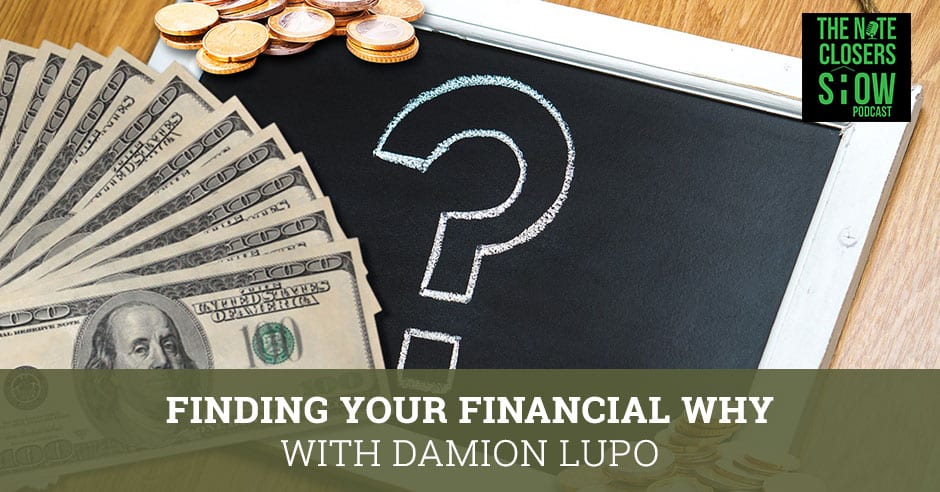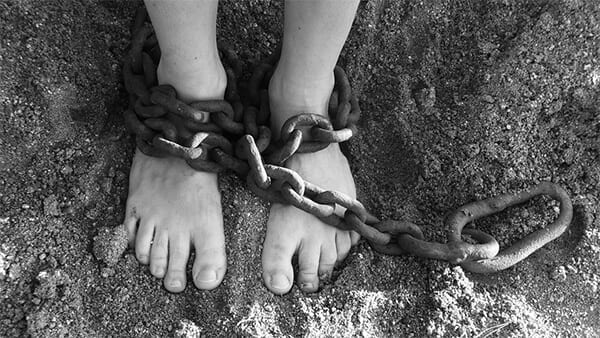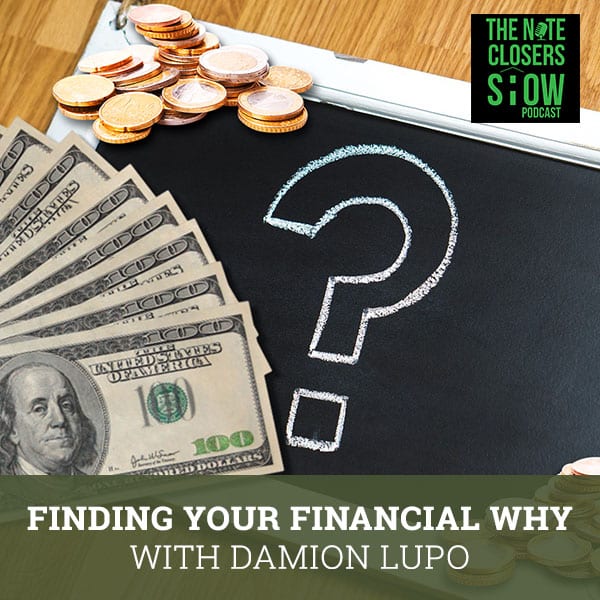
Money is an accelerator of who you are. The problem if you don’t know your financial why and it’s just all about the money, it’s never enough. Bestselling author and Transformation Nation podcast host Damion Lupo lost $20 million in assets during the economic slump of 2008. Like a lot of other people, he thought he was invincible and bulletproof. He didn’t have the foundation and didn’t have smart people around him to keep him informed and grounded. His ego took over until ultimately, the universe ran him over with a freight train and forced him to figure out what he was doing and why. Scott brings on financial expert Damion Lupo who shares his journey back from losing $20 million in profits during the downturn and how he worked hard to make it back and help educate other investors along the way.
—
Listen to the podcast here
Finding Your Financial Why with Damion Lupo
We’re excited to have a very special guest here who has an interesting story. You’re going to love this with what he’s got to share for you. He’s a bestselling author in personal finance and money thinking, host of the Transformation Nation Podcast, owns 30-plus companies and founded his own martial arts, Yokido. Our guest, Damion Lupo outrightly rejects regret and speaks to it as the ultimate life failure. He has a unique approach to living a fulfilled life by breaking rules and making more mistakes faster than the competition. His key to success is playing by a different set of rules. He even bought his first rental house with a Visa, a move that snowballed to owning 150 rental houses in seven states in less than five years.
In 2008, he lost the entire $20 million, but recreated his wealth and reinvented his life over four transformational years. He leads three global companies with one unified mission to free people from money bondage. We met at Podfest in Orlando and hit it off. Brett Berkey, a buddy of mine, was there to visit with me and you know him and it was a great conversation. We talked about having each other on the show. We’re excited. What happens after that is we get so busy and one of these dating coordinators for podcasters reaches out and I was like, “We’ve been talking about doing this.” I’m glad to have you on.
It’s good to be here. They have the car karaoke and this is like a hotel bar karaoke. We use to bump into people and you start singing some songs, connecting, bonding and then you show up on an interview.
You shared about $20 million in assets and then lose it like a lot of people during the downturn. That’s got to be a positive experience in your life, now that you look back at it and realizing that you can overcome anything.
Did you say a lot of people? I felt like I was the only one and that was the scary part man. There were a lot of people that melted down with many millions. I started off at twenty years old and I did all these deals. I made all this money. I thought I was the shit and built up this thing, and blew it up because my ego took over. I was like a lot of other people. I thought I was invincible and bulletproof. The problem was I didn’t have the foundation and I didn’t have smart people that I kept around me. They were there in the beginning and then I got too smart for him. I said, “I don’t need anybody. I’m too smart for you people.” Ultimately, the universe ran over me with a freight train and said, “Your ego needs to be put in check.” That’s where everything went away and I went, “Redo. Start over. Time-out box.” I had to figure out what I was doing and why because it was just about the money.
The problem if it’s just about the money, there’s nothing else and it’s never enough. You will literally kill yourself in the process and you’ll turn into a monster because you’ll just feed. It’s like having a parasite in your system. Money is an accelerator of who you are, we’ve all heard this. I didn’t know who I was, so I was adapting to whatever came at me. If somebody had a big idea, I’m like, “I can do that. Let me go do another one of those. I’ll do 100 of those. I can 10X the shit out of this.” This is like the Grant Cardone before Grant Cardone is Grant Cardone. I was going for it. That’s what happened. I had to start over in 2008 and reinvent my entire self.
We bought a lot of debts for people that were like that from 2008 to 2010. Thank you. I appreciate it. Let’s talk about that. A lot of people out there that read this, we have people that are active real estate investors and are looking to dive into things and they’re scared to take that plunge. You not only took the plunge, you went from Mount Everest to the bottom of the ocean and had to resurface back up. If you don’t mind sharing some of the things that you did to pull your head out of your ass, which we all do when we get at that point. You pulled yourself out of the valley to get to where you’re at now.
When I jumped off Mount Everest into the ocean, I didn’t just jump. I put a rocket on my ass and launched myself faster. It wasn’t 140 terminal velocity miles an hour, it was three million miles an hour. That was the thing. I was accelerating myself with all of the BS that I was being fed because it’s a self-perpetuating prophecy that you are the best and you look for things to tell you that you’re the best. I had to ask a different question. The way I get out of that thing was to take off the rocket, sit there and say, “What’s really true?” What’s true is I didn’t have anything guiding me. I had to figure out what was going to guide me going forward because I knew I didn’t want to do that again.
I didn’t want to give you an opportunity to buy more of my bad assets. I needed a different plan where I could actually keep some assets and have something that mattered because I didn’t want to wake up one day and look back and go, “Wow. Okay,” like Felix Dennis, a guy that I have a lot of respect for. He died recently. He made a lot of money but he was a lost soul. He’s the founder of Maxim Magazine. That’s where I was heading, asking the question, “What is true?” What’s true is I need to figure out what my values are and what mission am I going to be on. Like what is my life going to be about? Is it just about more houses or notes? Is that it? How many notes can you buy and how many king crab can you eat? How much wine can I drink?

Your Financial Why: Most people have financial bondage and they have no idea how to get out.
I started asking a question like, “What am I here for?” and the answer was, “I’m here to free people from financial bondage.” Most people have financial bondage and they have no idea how to get out. The work you’re doing with notes and teaching, that’s part of breaking that financial bondage. It’s getting people out of that stuff so they can actually live versus being zombies or part of the system where we’re stuck. Shifting into that, the interesting thing is that money starts to become a side effect when you start doing good and working towards impacting other people and freeing them. The money does happen. I’m not taking a basket weaving and becoming good at it. I’m doing something to impact other people in a positive way and that’s what changed everything. It wasn’t just about more assets.
What became your why? Was it starting to coach and teach people through their finances or help them break the chains?
There’s usually a trigger that hits us. This happened to me when I was sitting there with my dad a few weeks before he died. He looked at me, he was stage four and he said, “There were so many things that I wanted to do.” I went, “God.” I died. I broke down and I was crying. What I saw and felt, I experienced regret. That’s why it’s such a big deal to me because regret is the ultimate life failure. When you look back and go, “I wish I had done that.” You don’t have any more time left when you’re stage four and they say you got weeks and your organs will shut down. I said, “What can I do?” I can help other people get out of that trajectory towards regret and part of that is releasing the financial bondage.
It’s not about giving somebody cash or an asset, it’s about the confidence that they can go do it. If you have the confidence, you’ve got the muscle and you’re free because it could all be taken away. In 2008, take it all away, which they did. I have some confidence that I rekindled after I curled up in a ball for a while but I came back out and I said, “I know how to do this. You can take all my money away, but I’m still free because I can go create again,” and that’s what it’s all about. It’s empowering people to have that strength and confidence to go do their thing. It’s not giving them something, it’s teaching them to be really muscular fishermen.
It’s all about teaching a man how to fish versus giving him a fish.
That’s a lot of what our system teaches, “Here’s the entitlement or trust us, give us your money. Go away and come back in 40 years,” which is a great strategy if you’re going to smoke a bunch of opium. You wake up at 60 and you’re not rich, you’re just old, that’s a terrible plan. You’ve got to take responsibility, which is the core and then you look for people that can help empower you and teach you like what we do. We spent all this time empowering people and that’s a gift. That’s one of the reasons that we are put on this planet, to help other people and give them strength with tools and ideas.
What’s the biggest misconception that people have when you’re talking with them and helping them get on the right track?
This is the easiest one. It’s why my dad said what he did. It’s because we’re afraid of making a mistake. We’re afraid of the judgment. We’re trained to not make mistakes as kids. We go to school and they say if you get five out of ten, you’re a failure. If you get five wrongs out of ten in the real world, you’re a billionaire. It’s breaking that idea that failure is a noun. It’s a verb, it’s an effect. I would tell myself that if I could go back and say, “Fail faster, learn faster because you’re going to learn by scraping your knee.” You can’t learn to ride a bike by looking at the bike and reading a book about the bike, get on of the damn bike.
That’s the entire process. It’s fail as fast as possible, go make mistakes and get around people that support it. The problem is we are around all these people and we’re afraid of their judgment because they’re not saying, “You’re not failing fast enough.” They’re saying, “If you get hurt, that’s going to look bad.” We tend to not want to do things that are going to make us uncomfortable and we stay static. I have to break people out of that and give them little ideas and activities because you got to be in motion. We’re human beings, not human sittings, you’ve got to be in motion doing stuff. The biggest problem people have is they’re afraid of making mistakes.
We see that a lot too. They’re afraid they’re going to get out there and fall flat on their face. You’re going to learn more about falling flat on your face or getting punched in the jaw or learning more. I deal with people all the time that are so used to sitting in their comfort zone, showing up on the job and taking the two weeks a year or, “Let’s live for the weekend.” I’m like, “Go out and do something and if you work on the weekend, great. If you’re working more than 40 hours towards the passion, great. You’re actually achieving things. You work so hard to accomplish those things and you end up living a life that most people only dream about because you did take the time to learn from our mistakes and realize it’s not that bad to mess up.”
You’ve got to be willing to pay a price. You’re going to pay a price one way or another. You’re going to pay the price of discipline now or you’re going to pay the price of regret later. You choose. One is the default and if you don’t make the choice, the default is hell on Earth. That’s truly the worst possible scenario. The question is are you going to pay the price? Are you going to step up and say, “I’m willing to go trip on my thing and step on it a little bit and that’s okay?” A big part of this is who you’re surrounding yourself with. I alluded to it. When I started, I didn’t have any friends. Everybody’s looking at me and going, “Why did you drop out of college?” I said, “I’m going to hang out with people that understand me.” Their names were Tony Robbins and Jim Rohn. I listened to them on tapes. They were my friends even though they were this big. They were the people that I hung out with and so that was my influence. If you can’t find people in 3D that will influence you and support you, just listen to these podcasts over and over and surround yourself because you’ll start to become that stuff. That’s what will help shift you into a place where you’re doing something versus sitting there and listening to all the BS that your friends and family are constantly pouring into you.
You’re an average of the five people you surround yourself with the most. Surround yourself with good podcasts, books and audiobook. I burned out so many books and DVDs or CDs and listened to them over and over again around the same time in 2008, 2009 when I went through a rough spot as well too. That’s great advice. Don’t get me wrong, I’m a big fan of Gary Vaynerchuk and a little bit of Grant Cardone but at some point, you have to stop reading and start taking action. So many people spend so much time listening to everything. Time to quit listening and it’s time to start taking action. How critical is that to what you’re sharing?
I spent over a million dollars, real money, on seminars and mentors from 2000 to 2010. I spent $400,000 on one guy, $10,000 a month plus his seminars at his castle in Europe. The funniest part was I’d go to these seminars and I’d see a lot of the same people, like these addicts. We go there and the question is, “What are you up to you?” and they go, “I’m looking at deals,” “Have you done some?” “Yes, I’m doing about five to eight a month.” I go, “How many have you done?” “About five or six in Escrow or thinking about it or I’ve seen it or at least I’ve thought about five or six.”
What happens is these people go to the safety of just being at events and they don’t actually do anything. I can always tell somebody that’s full of crap as soon as they say, “I’m doing five to eight or five to ten.” There’s this magical mythical number. What I’m always interested in, “Tell me the one deal that you’ve done in the last year. Let’s talk about that one deal. Tell me all the stuff that you screwed up on that thing.” That’s what’s exciting to me. I don’t care about five to eight deals a month because in all likelihood, you haven’t done a single deal yet.
“I’m making some offers or I’m going to be out via the guest expert,” and I’m like, “How many deals did you close it with?” “I haven’t made any offers and I haven’t done anything.” I’m like, “You’re not getting anywhere.” Too many people believe the bullshit that they tell themselves and I’m like, “Quit scratching that itch and showing up, start doing something.”

Your Financial Why: The Law of Awareness means it’s next to you, but you got to go move to get it.
One of the problems is they’ve watched The Secret too many times. They think, “If I will do it, then the notes will fall out of the sky and hit me in the head. All that cash will come flying out of the ATM. I don’t have to do anything, I can just think it.” It doesn’t work that way, it’s called the Law of Awareness. Meaning, it’s next to you but you’ve got to go move to get it. It’s not necessarily in front of you. It’s off to the left and the right but you’ve got to be open. You’ve got to be able to see it and you’ve got to move over and take it.
The secret of success is not just watching the secret. Tell me about some of the companies that you’ve found. I’m so interested in you founding Yokido. What’s the different types of companies you’ve purchased or owning or running in different areas? How do they show up on your radar, you work with people or you buy into those things? How is that working for you?
When I first started investing in companies and setting things up, especially when I was investing, I was investing in the idea and the product. This is before Marcus Lemonis’ 3Ps: People, Process and Product. I did not understand people and process were more important than their product. I got excited. I invested in a restaurant because I love their muffins. That costs me $100,000. I invested in a car company that did high-end cars. I had a Ferrari and I decided one wasn’t enough, so I’m going to go get into a car company. I threw out $40,000 right before the recession in 2008. Goodbye $40,000 and cars. I did all these different things. What I realize now is that it’s the people and the process. I’m looking at the people and looking to see if they have a process.
I am deeply embedded with people and I don’t care if their deal works because I’m embedded with them in the relationship for the next ten or twenty years. It’s the fifth deal we’ve done together. It’s not the deal that I’m investing in now. I’m mostly looking for those types of deals. It’s easy to have a pitch but it’s hard to have a mission, commitment and integrity that I’m willing to invest in because that’s what I’m looking for. I’m still looking. Like any other deal, real estate or otherwise, I look at 100 before I invest in one because most of them are dog shit.
Your product doesn’t matter. It’s worth about 3% of the deal and it’s who’s going to execute. It’s all about the people executing. The major focus I have is focusing on people’s retirement accounts because there’s literally $26 trillion sitting in these things and people are stuck. They’re just hoping and they’re smoking all this magical opium riding their unicorn towards retirement and they think, “Wall Street told me it will all work out.” I’m teaching people how to take control of their retirement money, their IRAs or 401(k) so that they have a checkbook. This is not a self-directed IRA, this is a checkbook where you’re in control completely and you’re opting out of the tax system so you can buy notes, businesses, real estate, crypto, gold, all these things. You own it.
This is not for people that are reckless. It’s not for people that are irresponsible. It’s not for the Fox News, MSNBC, CNN watchers that are watching the bubble head people telling them what to do. If you want a different life, if you’re the type of person reading this and lasted this long, this is probably something you should know about because it does give you control and power over your retirement. That’s what I’m obsessed with. I don’t want to see people living with that regret. If you don’t control your retirement, if you don’t design and create it, you’re going to be in a state of despair and regret for many years and probably the last years of your life. That’s pathetic and sad. My mission is to break that. That’s my entire focus with that company.
When you talked about your father, I went through a very similar thing over ten years ago that has helped guide me. I don’t want to live with regrets, I’ll create great memories and I’m going to do things that I want to do. Go out there and find a way to get them done by surrounding yourself with good people and make it happen. You’re doing the same thing with that, which is awesome. Talking about 401(k), IRAs and stuff like that, people have to have a plan for where they want to go. I’m sure you’re sitting down and helping people design their plans, what do they want their life to look like, what they’re looking to bring in and how to identify those opportunities in the market.
Yes. I was talking with Robert Kiyosaki on a cruise we were on and we were teaching at. He says the same thing and I laugh every time I hear him say it. I’m like, “Why don’t people get this?” People go to him all the time because he’s this massive global celebrity and they say, “I’ve got $10,000. What should I invest in?” He’s like, “How the hell would I know? I don’t know what your plan is. What’s your plan to go?” “No, I don’t need a plan. I need you to tell me what to invest in.” “I don’t know what you should invest in. I don’t know what your plan is.” That is the first thing: Figuring out what the plan is. What is that vision? What’s the plan? The tools, which are the investments. It might be notes. You don’t know until you have a plan. You have to figure out where you’re going and what it’s going to take.
I’ll tell you a funny story. A guy called me and he said, “I want to do a consult for this QRP, this retirement thing,” and I said, “Great.” I get on the phone and two minutes into it he’s telling me how he needs to make more money. He’s only got $5 million in the bank and he hates his job. I said, “What are you talking about?” He goes, “I need to figure out how to make more money. I’m stuck.” I said, “How are you stuck?” It was in his head, he didn’t have a clear understanding that he’d already built the assets. He didn’t need to go work harder, he needed to stop and see what was in front of him. His awareness was shunted by his motion to be a little money bee. He was just out there chasing money nonstop. That was his thing and plan.
He needed somebody to shake him loose of his plan and redraw the plan. That’s what a lot of times people need is someone else. We don’t see it because we’re too close to it. Having somebody else that you can trust and respect enough to give you feedback and that you’ll do something with instead of going, “Thanks for that but I know better.” That’s why I don’t talk to those people because they’ll waste my time and I will give my time to people if they’ll listen to it because I have no skin in that thing. I have no dog in that fight. I want to see them do well but most people are too addicted to their own crap. They’re defending their ego and the choices they’ve already made. You’ve got to be willing to be humble and let go of your ego.
When you have $5 million in the bank and you’re complaining about your job, you’re the problem. With that, you could instantly quit what you’re doing and go do something that you’re going to enjoy.

Your Financial Why: You’re addicted to this thing and you give your life up for it. You’ve put yourself in shackles.
The problem is you go, “I’m making $700,000 a year,” and there’s an addiction. I see this as people move up in terms of their profession, you’ve seen this too. The more they make, the more addicted they are and they can’t let go because like the lawyer fallacy where you’re always working because if you do anything other than work, every minute costs you $5 or $10. You’re addicted to this thing and you give your life up for it. You’ve put yourself in shackles.
We talked a little about the profit of Marcus Lemonis and the difference between your profits and your passions and it connected with you being focused on profits. I had a chance to spend some time and talk with Marcus. He talked about how entrepreneurs don’t get so sucked into the passion. If the ship is going down, they don’t go down with the ship. They say, “Let’s move on. Let’s cut our losses and bounce to something else.” That way, when they have losses, they’re not as extreme as those that ride this ship down and kill everything, they bounce. It’s minimal losses as they moved from asset to asset or business to business. I think you’d agree with the same thing.
The question is how do you know and when do you know you’re on your first ship that’s taken on water. Back in the early 2000s, I was with a group of people in Austin and we were in this mentoring program. This gray-haired guy, 55-years-old says, “You’re all making a ton of money. You’re all making hundreds of thousands of dollars.” At the time, I was making hundreds of thousands a week and I remember going, “Tell me what you know but I know pretty good because you lost all your money. You lost $100 million, but I haven’t lost $100 million so I must be smarter than you.” This is what happens when you’re 25 and you have millions in the bank. I remember him saying, “Trust me. Take some of your stuff off the table because cycles happen. When that happens, you’re going to get flattened because of your ego and this is your first go-round,” and we’re like, “Whatever.”
A few years later, we’re all over there sucking our thumb in the corner in a fetal position going, “What happened?” It was because we didn’t listen to him because it was our first go-round. That’s the value of having people that have been through cycles. It’s the danger in having people managing funds and twenty-five-year-olds that have not been through a cycle and they don’t get it. Most people on Wall Street or in their twenties, they have no clue what’s going on because they haven’t been through a correction from 2008 or 2000 or 2001 or 1997.
Here’s the point of all that. When you’re starting out, you don’t know what you don’t know. You’ve got to have people that have been around for a while, that are there and help you see what you can’t see. When that ship’s going down, they will say, “This one’s going down. Get off this thing so you can build something again.” If you go down with this thing, your game is over. Understand that you won’t see it because you’re too close and it’s your first time. I can tell you, I smell things in advance now because it’s baked into my DNA.
Talk about the smell factor. I’ve been preaching that we’re going to see another downturn here relatively soon. What’re your thoughts on where the market is at, where it’s going, whether it’s the housing market or 20% of the market loss that happened with Mr. Marky Z and the boys?
Here’s what people think. They think it’s different this time. How many times have we heard this? “It’s different this time. It’s because we’ve got derivatives, tech, dot-com.” Remember DogFood.com when this was a $100 billion company and it was different because of the internet. It was a $100 million loss. Here’s where we’re at. Everything is in a bubble. There isn’t anything that’s not in a bubble. The only thing that’s been squashed for about the last five, six years is gold and silver. It’s been stalled but everything else has been pumped up by all this cash floating around and all this foreign investment. There’s a ton of money, billions and billions coming over from China that’s pumping up everything, equity markets and real estate markets. It used to be coastal. It was the West Coast, Florida. It was Russia and Venezuela with money coming up. Now, you see it in Nebraska and in Topeka, their stuff being pushed up and it doesn’t make any sense.
You also see from the tax cut that all these companies have all this money that they’re supposed to be putting into their people and expansion, what they’re doing is they’re buying their shares back. When they buy their shares back, all of a sudden their share is good because of the benefits. CFOs, CEOS, people that have options, they make a ton of money. Eventually, all that extra cash that’s been sitting is gone because it’s been used up. We are in a place where we’re going to have this run for a period of months, but my guess is and Doug Duncan, the Chief Economist of Fannie Mae, and I were talking about this in Florida. I totally agree. It’s coming.
We are going to be in a recession and if you’re not prepared for that, you’re going to get crushed. You can make a ton of money. Just be prepared. It doesn’t mean you have to be in hiding. My dad was a hoarder and waiting for the apocalypse. It’s going to come. It’s a cycle. You don’t just spend all your time fixated and obsessed. You get prepared and you go out and do your thing. That way when it happens, you’re like, “I’m ready. It’s basically planning.
I’ve done martial arts for twenty years. Instinctually, I know what I’m going to do if somebody comes at me with a knife or a gun or I’ve got ten people around me. I know how to line people up. I don’t think about it because I’ve gone through the training. That’s what we need to be doing now, finding smart people that have been around and get trained and get ready so that you can take advantage because that’s where all the money gets made. You made money off of me in 2008 inadvertently because idiots like me, we’re out there doing reckless things. A lot of recklessness is happening now and there’s going to be an opportunity. You see this in apartments, you see the yields and cap rates that don’t make any damn sense. There’s so much money chasing stuff, it’s not thinking money, it’s dumb money. Get ready to feed off of the dumb money. Warren Buffet does the same thing. You’re not taking advantage of anything. You’re just saying, “If people are going to be stupid in the market, I’ll help him.”
I was teaching a class and we’re looking at mortgage companies and literally pull up a list of, “There’s a growing list of non-prime lenders out there.” We don’t call it subprime anymore, it’s all nonprime. That number is growing and growing and people are cracking up at me because the hair was standing up on the back of my neck and I was like, “This is an awesome list.” “What do you mean, Scott? How is this an awesome list?”
I’m like, “When everything hits the fan, this is the first sign here. When these idiots, these twenty-year-olds that have replaced 50-year-olds who have retired and took the golden parachutes and left, they’ve got to create these products that are going to be profitable in the market. It’s all stupid money coming in and not smart money, it’s all stupid money coming in and trying to beat the competitor.” It’s all happening all over again like it did in 2007, 2008, 2009. It’s all about seeing the signs, being prepared and building a plan of action so that when it does hit, you can take advantage of the market.

Your Financial Why: If you don’t have a plan, you won’t take action.
If you don’t have a plan, you won’t take action. I hear this all the time, “I’m going to wait until the prices come down.” I’m like, “At what price are you going to buy?” They go, “When it’s lower.” I go, “How much lower?” What happens is it’s falling knives. You’re not going to know if it’s going to go lower. It’s why Bernanke was so scared of a depression. That debate was based on deflation because when prices are dropping, people’s fear kicks in and they’re afraid it’s going to go lower. They hoard and freeze and the prices just keep dropping. That’s what happens when we go into recession. People aren’t going to naturally buy at the bottom, they’re going to freeze until we bounced off the bottom and we launched and they’re going to miss it.
You’ve got to have a plan. If you think you’re going to go engage when things correct and you get a better deal, you’re crazy. I heard people talking about that with bitcoin when it was at $19,000. They said, “I missed it. I’m going to wait for it to go down.” I go “So what?” and they’re like, “Better.” Now, it’s $7,000, $8,000. I go, “What are you waiting for? You’re waiting for it to go to zero?” You can say that but it’s a good way to psych ourselves out of reality and to allow ourselves not to take action because we keep it very vague and we don’t commit to anything. Commitments are where all the juice is and that’s where the plan comes into play because it’s in front of you.
The plan of action are specific measurable goals that have a date on them as far as execution.
Somebody else can give you feedback like, “You committed to this, what are you doing? Taking action?” We’ll do more for other people. It’s a consistency thing. If you haven’t read Influence by Robert Cialdini. It’s a powerful factor. If you make a commitment, you’ll tend to stay with the commitment. If you’ve got a mentor, coach an accountability partner and you say, “Here’s my commitment,” and it’s definitive, time-bounded and specific and measurable. You tell them you’re going to do it, you’re more likely to do it than if you just think about it. People say, “I’ve got a vision.” I go, “Where is it?” They go, “It’s in my head.” I go, “You don’t have a vision. You have a daydream.”
How did you think I got so smart? I got really stupid for a long time. If anything sounds good, it’s because I sounded stupid for so long and because I made every mistake under the sun. Whether it’s me or you or somebody else, find people that have been beaten up and get it because they’ve gone through it. You don’t want somebody that goes, “I get it because I read a book. I’ve got a PhD from Harvard.” Who gives a crap about your academics? I want to know about your real-world experience.
Also, “I’ve never made a mistake. I’m perfect.” Just run. I was at an event. There was a guy from LA, he has his own reality show and we asked him who his mentor was and if he’s made any mistakes. He’s like, “I’ve never made mistakes.” I’m like, “Really? You just lost the entire audience because you get your heads so far up your ass. You’re not coachable or people don’t want to be around that.”
People want to learn from people that have made mistakes because they’re like, “Am I doing the right thing?” “Don’t do that, idiot. I did that and this is how I screwed up. You need to do this or tweak this because this is valuable.” I’m sure it’s also frustrating for you too because you’ve probably experienced this. I wish it was 100% or 50% of people out there with doing things. What’s the percentage you think you see that people are taking your advice, hearing your instructions or coaching, and actually going out and doing it?
If I see 1 in 100 people that do what I say and suggest, I’d be amazed. It’s when people come to me, it’s reserved. I have two people that I’ve been doing one-on-one work with and it’s on purpose because I don’t want to waste my time. Most people aren’t going to do it. My time is too precious and I don’t need the money or brain damage from people that are going to cause me stress because they’re going to say, “I don’t know about what you said but I’ve got a better idea.” “Then you don’t need me because you already know everything.” People generally have to come in and say, “I’m putting my ego aside and I want to do great. I want to live full on and I need help because I don’t know what I don’t know.” Those are the people that I get interested in working with. The rest of them is not even worth the time. I’ll hear the story for about five minutes, I wish them well and then I move on because they’re not ready. They’re not humble enough to listen.

Your Financial Why: You don’t know what you don’t know. You got to have people around you to give you feedback.
You’ve got your Transformation Podcast. Talk about it a little bit. You and I are banging our heads because we see all these people that want to do something but they’ve never filmed their first episode. How do people get ahold of you there? How do they learn about what you’re doing?
The entire point of Transformation Nation is the financial transformation. There are a lot of things that we need to work on in our lives, whether it’s our health or our relationships, and all that stuff. This is fixated on financial transformation. It’s for people that want to understand what’s stopping them and ideas that they can do something with, so it’s not just more information. We live in a digital hoarding society where you can get unlimited information. There are 500,000 to a million podcasts. You can spend all your time listening to podcasts. This is about boiling it down and having guys sharing what people can do to start financially transforming their lives. It’s a nation of transformers so that we’re taking financial bondage out of the equation. Imagine what happens when you take financial slavery off the table.
I read this in Ray Dalio’s book, Principles. He talks about how we don’t think about eating. If we’re hungry, we go eat. Most Americans, this is our thing, we don’t think about it. Imagine when you have enough money where if you want to go do something, you want to buy a car or a house or you’re going to trip, you use your credit card or go to the ATM and you never think twice like you don’t think about eating. You don’t go, “Should I eat?” You just do it. Take money out of the equation. What would your life look like? It’s hard to imagine for most people because everything they do is based on, “How much did it cost?” “I don’t know if I can afford that.” “I’ve got to wait for twenty years.” The idea here is to break that and to change society so that we’re focusing on relationships and impact.
I have an acronym for the human needs that are missed and ones we should focus on. Instead of significance and security which are what we focus on, the money and the shiny objects, the focus is on the PEEC life, which is the people, relationships and experiences that you have. I’m going to Africa to see gorillas, that’s an experience. I’m not waiting until I’m 70, crusty and decrepit. I’m going now. The environment, where are you living? Are you living in a piece of crap place because you’re saving money? Are you living in a great place?
Ultimately, the biggest one is the contribution. What is your life’s purpose? What are you doing? What are you going to speak? Most people, you give them a bunch of money, you say you’re done, you’re retired and they’ll be dead in three years. You need some purpose and the contribution for other people. It can’t just be about your consumption, which is the other deadly sea. That’s the point of Transformation Nation, it’s about giving people the tools and ideas and breaking their framework that will set them free financially.
Was it PEEC? People, Experiences, Environment and Contribution. The question is, what’s the biggest advice you would have given to your 25-year-old self?
Keep the bald gray-hair dudes close. You don’t know what you don’t know and you’ve got to have those people around you to give you feedback. One of the things that they’ll say, “You’re going to miss your life if you’re obsessed with just the cash.” I can tell you there were missing decades where I go, “What was I doing?” I was whoring myself out for more dollars and I wasn’t focusing on the people. I wasn’t focusing on the relationships, I was focusing on transactions. I wasn’t focusing on contribution, I was focusing on consumption. My environment? Whatever, it was about more of everything. That’s what somebody that’s been through it and that’s wise, stable, sound, principled, and present will tell you.
A lot of people get so stuck in their ways or what they know. What do they know? They don’t know anything, they’re not me. They’re not in my shoes. God forbid, history has repeated itself and will repeat itself again out there and you want to learn from those who have gone through things. The lessons that our fathers had taught us for years, one of the most inspiring moments came from a place of pain. My dad did the same thing when he’s old, “I wish I would see this. I wish I was around to do this. I wish I would have done a lot more.” I hear that voice in the back of my head every time an opportunity presents itself, “Let’s run with it. Let’s see what we’ve got available.” Let’s not say no, let’s say yes and figure out how we do it.
That’s a big part of what happens when you listen to people, you’ll open space because you’re not going to be fixated on knowing. You’re going to be more curious. If you let your curiosity drive you and ask, “Why?” I remember hearing Robert Kiyosaki say, “Stop saying you can’t afford things. Ask how can you afford them?” I was like, “How can I afford this?” I afforded everything and I blew myself up because I was going after everything. I missed the question about, “Why does this matter? Why does it matter to have a second Ferrari? Why am I doing this?” That was where it would have been helpful to listen to my grandmother.

Your Financial Why: Stop hesitating. You go all in and you pull the trigger. That’s what life is, pulling the trigger.
I remember in 2005, I was with my girlfriend and we visited and she sent me a letter and it was brutal. She sends me this letter and it said, “Damion, you should stay single. You’re too much of a selfish asshole. You should not be with anybody.” I went, “Grandma.” She slayed me and I had some choice words for her. Looking back I was like, “She was right.” It was when I realized that she was right, I could start asking, “What’s the problem?” Obviously, the problem is me. What do I do differently? I’m not going to ever be in a relationship if I’m going to be that guy. She saw it. It was so obvious to her. That’s why listening to these people is going to be a differentiator because we’re too full of ourselves. We’re too right and righteous. Just listening, shutting our mouth, opening our ears and saying, “Maybe everything I think is wrong. Maybe, maybe not. How are you going to know unless you start listening?”
You’ve got twenty years of experience in martial arts, I’m sure that’s got to help out with the dedication and consistency of doing something for twenty years and becoming an expert. You’ve got the 10,000 hours of experience with things like that, of doing that in a regular basis. How did you create your own martial arts, Yokido?
I was teaching at an event and we were talking about the 10,000 hours with Malcolm Gladwell and the mastery process. I said I’m probably somewhere around 20,000 hours at this point. When you spend 10,000 hours doing something, something pops out of you that’s a new creation. Spontaneously, you birth something and I birthed Yokido. It was because all of me came out in something that was unique and it wasn’t just me regurgitating something. That’s the value in finding people that have gone deep into anything, you find something unique. If somebody is gone off the surface and they’ve spent a little bit of time, you get to see the same thing. Most books out there, self-improvement, personal development, real estate, they’re all the same crap.
What I look for somebody’s deep emotional story baked into that thing. I want to understand something new. The information is all the same, but the stories and essence are different. That’s what Yokido was. It was the essence of me taking Aikido, Yoga, and Reiki and baking these all together. What is this? This is an art about blending. It’s about healing people in that process. It’s not about conflict, it’s about releasing conflict. It’s about going into the relationship and not only avoiding the conflict but healing the opposition.
Healing the person or the thing that’s the problem. That’s very different because most people aren’t thinking about healing anything, they’re thinking about defending themselves, so this is a shift past that. It’s interesting that it shows up because it’s who I am, Yokido is truly who I am. It shows up in everything I do. When I work with people on their retirement or their money, they don’t realize it but they’re in the middle of a dojo and have a martial arts practice, we’re doing Yokido. They think it’s about finances, profits and losses.
Are you going to have a book coming out?
There’s a book on the essence of what is the philosophy of Yokido. It bakes in a lot of the financial ideas and philosophies so that people can understand, from this perspective, how to start shifting their awareness so that they can show up and have a walking Akito, Yukito. A walking flow, and interaction with everything they do. It’s going to be a lot of fun for people to see, experience and go deep into that space. It will be unlike anything they’ve ever read before.
What’s the best way for people to get ahold of you, reach out to you, email, social media?
I feel bad because people will send me a message and they’re all excited and I get excited to see them, but I don’t see them for six or eight weeks because I hardly spend any time on social media. I’ll share what’s going on, I’ll tweet it but I don’t spend a lot of time there. I’m too busy creating and serving people. I don’t think most of us do a whole lot of good by retweeting all the time and staying obsessed with feeds on social media. That drains the life energy out of us. I don’t think we have the creativity that gets unleashed if we spend all our time on somebody else’s platform, building up their net worth. This is not what I’m here for. If you want to reach out to me, go to DamionLupo.com and send me a message directly. I’d love to connect with people. That way you’ll actually get to me and I’ll get back to you. That’s the best way. I live there in my space where I can create and share what I am with the world.
Where in Africa are you going to look at gorillas?
One of the last places and it’s the only place there in Rwanda, Uganda, that region. I don’t know how many are left, but it’s not that many. You’ve got to understand that a lot of these things that you want to do on your bucket list, there’s a window where they’re not even going to be available. This may be one of those. I don’t know what it is for you guys that are reading, but the truth is in that bucket list, you need to start booking stuff and not just looking at it. The opportunity popped up, it was on my bucket list and I said yes. Literally, five seconds after I got the email saying, “I’ve got a trip going on, do you want to go?” I said, “Yes.” I didn’t care when and how much, I just said I’m in because I know that life is short. When you have those moments where somebody looks back and says, “I wish I could have done more things. There were things I missed out on.” You stop hesitating. You go all in and you pull the trigger. That’s what life is now pulling the trigger.
That’s a great place to end this episode, pulling the trigger, taking action, going out and doing things. Not sitting back on it. Go out, surround yourself with good people and make it happen. It was an absolute joy to have you here on the show, Damion. Thanks.
Thanks, Scott. I appreciate it.
Don’t sit back and have regrets, go back and have victories. Go have things that you do to check off your bucket list. Go make things happen and trust me, you’ll be a lot happier there achieving the PEEC: People, Experiences, Environment and Contributions. See you all at the top.
Important Links
- Transformation Nation Podcast
- Yokido
- Damion Lupo
- Marcus Lemonis
- DogFood.com
- Fannie Mae
- Influence
- Principles
- DamionLupo.com
About Damion Lupo
 Best Selling Author in personal finance and money thinking, host of the Transformation Nation podcast, owner of 30+ companies and founder of his own martial art – Yokido ® Damion outrightly rejects regret and speaks to it as the ultimate life failure. He has a unique approach to living a full-filled life by breaking rules and making more mistakes, faster, than the competition – his key to success. Playing by a different set of rules, he even bought his first rental house with a VISA, a move that snowballed into owning 150 rental houses in 7 states in less than 5 years. In 2008 he lost the entire $20 million but recreated his wealth and reinvented his life over 4 transformational years. Today he leads 3 global companies with one unified mission – to Free People from Money Bondage.
Best Selling Author in personal finance and money thinking, host of the Transformation Nation podcast, owner of 30+ companies and founder of his own martial art – Yokido ® Damion outrightly rejects regret and speaks to it as the ultimate life failure. He has a unique approach to living a full-filled life by breaking rules and making more mistakes, faster, than the competition – his key to success. Playing by a different set of rules, he even bought his first rental house with a VISA, a move that snowballed into owning 150 rental houses in 7 states in less than 5 years. In 2008 he lost the entire $20 million but recreated his wealth and reinvented his life over 4 transformational years. Today he leads 3 global companies with one unified mission – to Free People from Money Bondage.

